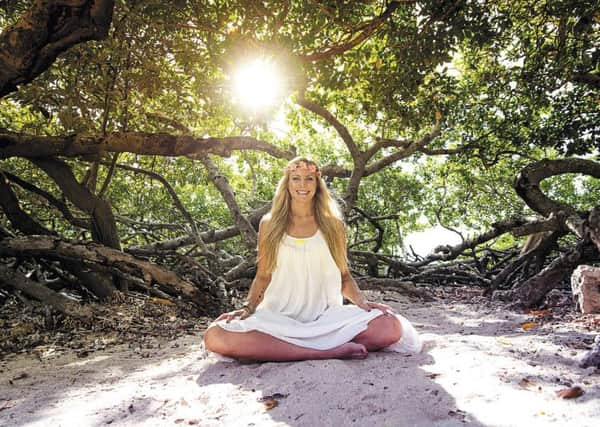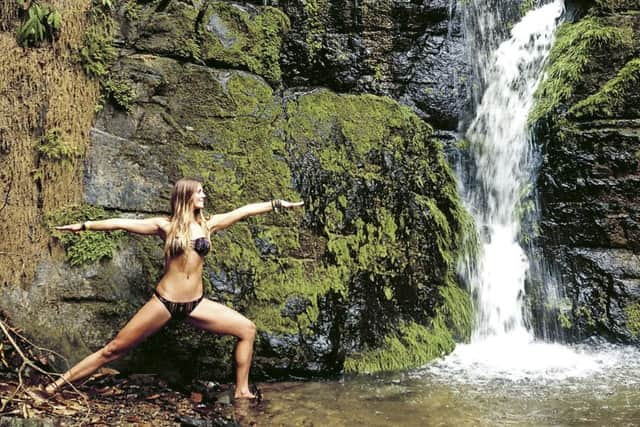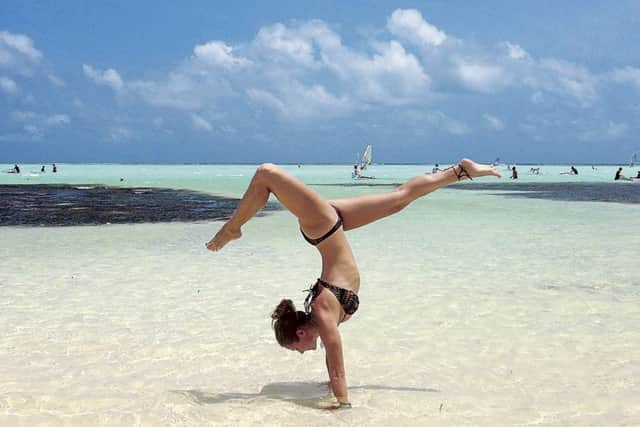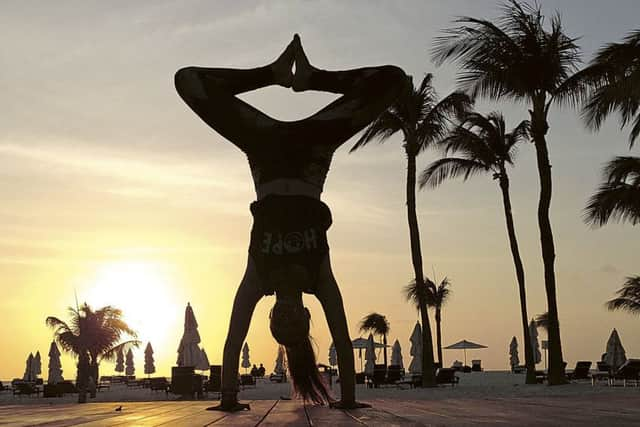Instagram star Yoga Girl stretches out into literary world


I have been meditating every day for the past week. I’m not a complete newbie at this; I’ve done some before, but I usually find it hard to stick with it, to get the time – even 30 minutes in a 24 hour day – and if that isn’t the story of someone who needs to meditate, I don’t know what is. But this time feels different. And the person I think I need to credit for making this so is Rachel Brathen.
Also known as Yoga Girl, Brathen is the woman behind an astonishingly popular Instagram account which has 1.5 million followers. If you haven’t seen it, it’s not complicated. Imagine a photogenic young woman doing incredible yoga poses – handstands, shoulder stands, often while on a paddle board on crystalline waters, or leaning on a palm tree, and pretty much always smiling. Does it sound like the kind of thing that would send you into paroxysms of envy and the biscuit tin? I know it does a wee bit, but there’s more to it, more to Brathen, than this. Take her new book, Yoga Girl, a combination of yoga manual, memoir, the odd recipe and lots of photographs. It’s already a New York Times bestseller and I absolutely understand why. In a sea of self-help platitudes, Brathen’s writing is convincing. There is something about what she says that makes sense and, from her, it is believable. We are too harsh on ourselves. We need to create some space in our lives. Silence is a support. Yes, she is a woman whose body can do things that honestly, mine never will, but she is also someone who makes you believe that she knows the joys of a good bottle of wine and a tub of ice cream too. Maybe the tone of her writing works because it’s what she’s been doing on Instagram for years now.
Advertisement
Hide AdAdvertisement
Hide Ad“Being totally honest was really terrifying in the beginning,” she says, from her home in Aruba, the Caribbean island that is the backdrop for all those photographs and where she lives with her husband, Dennis, and their dogs. “There’s a lot of negativity and hate out there. But something I’ve realised is that the more transparent I am, the less negativity I get.


“If people look at someone’s photo and it’s perfect and everything all the time is this fake, superficial perfect life, it makes them want to pick you apart – ‘your life can’t be that perfect because look at your cellulite’ or ‘did you gain some weight this past month?’ – things that they’d never say to a real human being. But the moment you allow yourself to be human and say I’m having a s**t time and here are my insecurities, people all of a sudden realise that they feel the same and the negative comments stop.”
Brathen did her first Instagram post in 2012. It attracted zero followers. But Yoga Girl is now an internet phenomenon. She posts as often as three times a day, she has a website too and as well as her online activities she travels the world teaching yoga – her classes and retreats are massively successful. She has become, she says, a “little desensitised” to how many people read what she writes online, but she understands the responsibility of having an audience, including a lot of young women, who hang on her every word. “I want to be myself, I don’t want to try to be something that I’m not,” she says. “I’m fairly certain that if I was to go on a diet tomorrow and post that I was unhappy with my body and wanted to lose 10 kilos there are lots of 14-year-old girls who’d say, ‘yoga girl diets so I’m going to diet too’ and that’s definitely not what I’m about.”
What I like about Brathen’s message is her dictum that we need to ‘start where we are’. Really, she means it. And it pleases me enormously because in saying it simply and boldly she interrupts the thinking that goes – once I’ve bought an entire new wardrobe and my bum is a bit smaller/hips a bit more flexible then I will be absolutely ready to begin yoga. It’s the perfect way to feel beaten before you’ve even begun. “We all have that tendency to look around the room and compare ourselves to other people and find lots of reasons why we’re not good enough and why it’s too hard and then we quit. It’s not what yoga should be. Look at social media, or yoga journals or magazines, every single yogi is a thin, blonde, super, hyper-mobile girl. And that is not the case. And I know that I kind of fit that stereotype so that’s why I wanted to share my path to the practice so that people know it wasn’t like that at all. People think that I was a gymnast or that it was all so easy for me to say because I’d had it easy my whole life, but it wasn’t all easy. It’s been a huge struggle and it still is.”
When Brathen speaks about struggle, she’s knows what she’s talking about. Chaotic is probably the word that best describes her childhood. Her parents divorced when she was two. Then her mother started a new relationship with a man who was a pilot in the Swedish Army. What followed was a period of relative stability until tragically, he was killed when his plane crashed into the sea when Brathen was just five years old. Brathen’s family was catapulted into trauma. As her mother struggled to cope with her grief, Brathen and her brother had to grow up quickly. By the time she was 12, she’d lived in 10 different places. The emotional scars of what she’d been through were buried deep and for a long time she had few memories of any of that period. But, by the time she was a teenager, her distress was finding a different way out. She started to smoke, to take drugs, to rebel against her family in the only way she, at that age, understood how. She got her first tattoo at the age of 13, she was pulled over for drink driving when she was 16. At 17, this time the passenger in a car being driven by someone who was drunk, she survived a serious car crash when the car she was in skidded off the road, smashed into a tree and ended up on its roof.


She writes about this period of her life in a matter of fact way. She’s not milking it for drama, she’s not filled with contempt or patronising about her younger self or in any way sentimental. “I had turned into an incredibly difficult person,” she writes. “I thought life was about living as fast as possible, and looking good while doing it.” Some of the best responses that she gets online, she says, are from people who have been moved to share their struggles by following her example. “In their mind, I am this perfect person, with a perfect life – I live on the beach and spend my time doing yoga, it sounds like a dream – but I have experienced this stuff and I’m not afraid to share it.” Sharing online has now become “almost part of my healing process,” she says. “It’s not so much about getting positive comments back, it’s about allowing yourself to be really vulnerable and still OK as opposed to walking around in this armour all the time – everything is good, I’m really strong. Vulnerability is good and knowing that there are people out there who feel the same, who have gone through the same and are putting words to their emotions is a good thing.”
Reading about Brathen as a young teenager, I felt so sad for her. She was failing, struggling, taking her fear and pain out on herself and in the process making everything so much worse. I wonder what she feels looking back?
Advertisement
Hide AdAdvertisement
Hide Ad“I just want to give myself a hug.” She laughs. “And tell her that this is not the end of the world and everybody goes through that time. We always look back at the past and say I was so beautiful then, I was doing so well then, but it’s so hard to do it now. I’m sure in 10 years I will look back at my 26-year-old self and be like, oh wow, there were so many things I didn’t appreciate. The journey and the lesson is that it’s about seeing what’s really good now, not appreciating it later.”
It’s not surprising that Brathen’s interest is, in some ways, focused on young people, particularly young women. Partly as a result of her own experiences and also understanding as she does the impact of social media, she understands how hard it is to be a young woman today. “They need to learn that it’s OK to be the way you are, to be sad or struggling. I really think that could help a lot because I’m a little worried about what’s going to happen.” She stops speaking and there’s a pause and then a nervous laugh. She seems a bit embarrassed by what she’s said, but she means it. “I have sisters who are now between the ages of 12 and 18. When I was that age we had TV with occasional commercials, billboards on the way to the bus and I’d read Just 17 or Cosmopolitan, whatever the Swedish version was, and that was it. Now, girls wake up and their phone is in their face, literally. Before they even get out of bed they spend 20 minutes scrolling through what’s been happening on Instagram, Facebook, Tumblr and all these other places. And their phone stays glued to their face until they go to bed at night. It’s made it much harder to have a normal perspective on what is a normal body, or what is a happy life.”


The feedback she gets from young women particularly has motivated Brathen to create www.oneoeight.tv, an interactive online platform with tutorials from counsellors and experts as well as live-streamed yoga classes. It launches later this month.
When Brathen hit her own nadir – drinking vodka in a parked car in the school playground instead of attending her high school graduation with her friends – her mother intervened. She sent her to a residential therapeutic meditation retreat. She says she has no idea how her mum convinced her to go. But I wonder if she, even at the tender of 18, knew that she was spiralling into a life that was going to be harder and harder from which to escape. I wonder if, as young and as angry as she was, she was scared for herself?
“I definitely was. For sure. I think there was a part of me that really wanted to have a good life. I didn’t know that consciously. I didn’t even know how to think about that stuff, I was so preoccupied with the pain and insecurities, I felt that this was what life was.”
It wasn’t yoga that changed her life, at least not at first. It was meditation. At the centre, in northern Sweden, twice a day there were group meditations and therapeutic sessions and in between those there was absolute silence. She worked through some of what she’d experienced as a child, felt the anger towards her parents and herself that she’d been battling so hard to keep at bay.
“It didn’t make me a different person, it’s more that it gave me the first opportunity to understand that life didn’t have to be only this, there is more available. This little seed was planted that actually I might be happy. I didn’t know before that I wasn’t, so it’s really hard to change something if you’re not aware of the fact that you have to change it.”
Advertisement
Hide AdAdvertisement
Hide AdShe did another 10-day course on how to resolve childhood issues. It had a profound effect on her. “It wasn’t so much that I was becoming a different person… I was becoming myself,” she writes. It wasn’t long after this transformative experience that Brathen decided she needed a fresh start. She needed to leave Sweden. In part, she says, she needed to be away from the relationships she’d been in – she had started the process of changing but the people she’d been hanging out with during her teens were the same. She booked a ticket to Costa Rica. Living on the beach, working as a waitress when she needed the money, she started to find herself.
Fastforward a few years and Brathen had become only more convinced of the benefits of meditating and this had led into yoga practice. She found a way to feel healthy and well and to really be herself. What started as something just for her became a practice to share. It’s why she’s so keen to spread the message. She knows, first hand, that it can work. And she knows too, that had she stayed in Sweden, “I would probably have led a very different life.”
Maybe this is Brathen’s secret, although she’d not describe it that way. For her, there is no secret, it’s just about living and knowing that nothing is perfect and lots of things are possible, even when it doesn’t feel like that. But the fact that a very different life was once within touching distance means that what can often sound like platitudes resonate with something more real when Brathen speaks. “I don’t have a perfect body,” she says. “I don’t have a six pack, I am very, very normal. I have cellulite. And then I have a woman in my class who weighs 250lbs and for her it seems ‘easy for you to say, sitting there all pretty with your blonde hair living in paradise. What about me?’ I think what it really comes down to is that we need to work on our own minds. We can compare ourselves to others – imagining that she has it better or easier or harder – but really in our minds we all create our own prisons. It’s not about what the surface tells us or what the reflection in the mirror tells us, it’s about what we tell ourselves.”
• Yoga Girl: Finding Happiness, Cultivating Balance and Living with Your Heart Wide Open by Rachel Brathen is published by Yellow Kite, £16.99